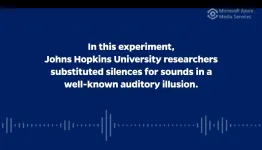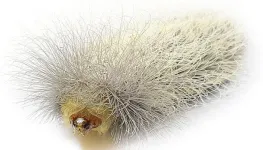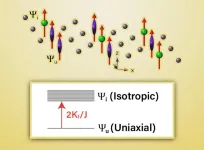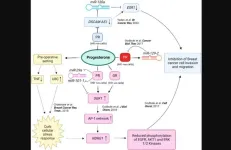(Press-News.org) Researchers at the FAMU-FSU College of Engineering and the National High Magnetic Field Laboratory discovered that atomic-level structural changes occur when the compound tin selenide heats up — changes that help it to conduct electricity but not heat.
The study, funded by the National Science Foundation and Department of Energy, provides information that could lead to new technologies for applications such as refrigeration or waste heat recovery from cars or nuclear power plants. The research was published by Nature Communications.
“Tin selenide is a curious compound,” said Theo Siegrist, a chemical and biomedical engineering professor at the FAMU-FSU College of Engineering. “It has gotten a lot of interest for its special high-temperature thermoelectric properties. Optimizing those characteristics may lead to viable options for sustainable power generation and other uses in the future.”
Scientists already knew that tin selenide had a high thermoelectric coefficient at elevated temperatures, meaning it can create a strong electric current from a temperature gradient. The question was why and how.
The researchers found that as the compound heated up, the bonds between tin and selenium remained mostly unchanged, still connected by three short and several long bonds. But the tin atoms in the compound began to move around, changing from a fully ordered lattice structure into a partially disordered one.
“The initial idea about this change was that the atoms were displaced, but we found that it is an order-disorder phase transition that was actually what was happening,” Siegrist said. “The tin atom was flopping around, so to speak. That was what allowed tin selenide to scatter the energy waves that conduct heat.”
A good thermoelectric material needs strong electrical conductivity but thermal conductivity that is as low as possible. In tin selenide, this is achieved by a dynamic partial disorder of the tin atoms at elevated temperatures that results in a reduction of the heat conductivity.
Siegrist collaborated on the work with researchers from Oak Ridge National Laboratory, or ORNL, and the University of Tennessee, Knoxville. They used a type of particle accelerator at ORNL called a spallation neutron source to test the material. The accelerator shoots protons onto a target to generate bursts of neutrons, allowing scientists to analyze that target’s crystal structure.
By examining what is happening at the atomic scale, researchers can understand what is driving certain properties that engineers may want to optimize.
“This is fundamental research, and we are interested in the mechanism and influence of the material to get it to do what we want in a thermoelectric device,” Siegrist said. “All these ideas can improve energy conversion devices by making them more efficient.”
Along with researchers from ORNL and the University of Tennessee, Simon A. J. Kimber from Burgundy-Franche-Comté University contributed to this paper.
END
Curious compound: Tin selenide may hold the key for thermoelectric solutions
2023-07-10
ELSE PRESS RELEASES FROM THIS DATE:
Massachusetts drinking water may contain unsafe levels of manganese
2023-07-10
FOR IMMEDIATE RELEASE
Contact:
Jillian McKoy, jpmckoy@bu.edu
Michael Saunders, msaunder@bu.edu
##
Massachusetts Drinking Water May Contain Unsafe Levels of Manganese
A new study measured manganese levels in the residential tap water of a Holliston, Mass. community and found that the manganese concentrations occasionally exceeded the maximum safety level recommended in state and federal guidelines.
Manganese is ...
Scientists discover 36-million-year geological cycle that drives biodiversity
2023-07-10
Movement in the Earth’s tectonic plates indirectly triggers bursts of biodiversity in 36‑million-year cycles by forcing sea levels to rise and fall, new research has shown.
Researchers including geoscientists at the University of Sydney believe these geologically driven cycles of sea level changes have a significant impact on the diversity of marine species, going back at least 250 million years.
As water levels rise and fall, different habitats on the continental shelves and in shallow seas expand and contract, ...
The sound of silence? Researchers prove people hear it
2023-07-10
Silence might not be deafening but it’s something that literally can be heard, concludes a team of philosophers and psychologists who used auditory illusions to reveal how moments of silence distort people’s perception of time.
The findings address the debate of whether people can hear more than sounds, which has puzzled philosophers for centuries.
“We typically think of our sense of hearing as being concerned with sounds. But silence, whatever it is, is not a sound — it’s the absence of sound,” said lead author Rui Zhe Goh, a Johns Hopkins University graduate student in philosophy and psychology. “Surprisingly, ...
Caterpillar venom study reveals toxins borrowed from bacteria
2023-07-10
Researchers at The University of Queensland have discovered the venom of a notorious caterpillar has a surprising ancestry and could be key to the delivery of lifesaving drugs.
A team led by Dr Andrew Walker and Professor Glenn King from UQ’s Institute for Molecular Bioscience found toxins in the venom of asp caterpillars punch holes in cells the same way as toxins produced by disease-causing bacteria such as E. coli and Salmonella.
“We were surprised to find asp caterpillar venom was completely ...
Global cooling caused diversity of species in orchids, confirms study
2023-07-10
Research led by the Milner Centre for Evolution at the University of Bath looking at the evolution of terrestrial orchid species has found that global cooling of the climate appears to be the major driving factor in their diversity. The results help scientists understand the role of global climate on diversity of species, and how our current changing global climate might affect biodiversity in the future.
One of the largest families of plants, there are around 28,000 species of orchids growing across the world. These plants are known for their huge variety of different sized and shaped flowers, so why are there so many species
Climate change driving speciation
Charles ...
Real-world context increases capacity for remembering colors
2023-07-10
Human memory is fundamental to everything we do. From remembering the faces of someone you just met to finding your cell phone that you just left on a table, one's "visual working memory"— the core cognitive system that retains visual information in an active state for a short period of time, plays a vital role. Prior work has found that visual working memory capacity is well correlated with other important cognitive abilities such as academic performance, and fluid intelligence, which includes general reasoning and problem solving, so understanding its limits is integral to understanding how human cognition works.
In the past, theories have proposed that an individual’s ...
Argonne scientist Shirley Meng recognized for contributions to battery science
2023-07-10
The Electrochemical Society (ECS) has selected scientist Shirley Meng of the U.S. Department of Energy’s (DOE) Argonne National Laboratory as the recipient of the 2023 Battery Division Research Award for innovative research on interfacial science, which has led to improved battery technologies.
A pioneer in discovering and designing better materials for energy storage, Meng serves as chief scientist of the Argonne Collaborative Center for Energy Storage Science (ACCESS) and as a professor at the Pritzker School of Molecular ...
Researchers make a surprising discovery about the magnetic interactions in a Kagome layered topological magnet
2023-07-10
A team from Ames National Laboratory conducted an in-depth investigation of the magnetism of TbMn6Sn6, a Kagome layered topological magnet. They were surprised to find that the magnetic spin reorientation in TbMn6Sn6 occurs by generating increasing numbers of magnetically isotropic ions as the temperature increases.
Rob McQueeney, a scientist at Ames Lab and project lead, explained that TbMn6Sn6has two different magnetic ions in the material, terbium and manganese. The direction of the manganese moments controls the topological state, “But ...
Deciphering progesterone’s mechanisms of action in breast cancer
2023-07-10
“The mechanisms underlying the observed effects of progesterone on breast cancer outcomes are unclear.”
BUFFALO, NY- July 10, 2023 – A new research perspective was published in Oncotarget's Volume 14 on July 1, 2023, entitled, “Deciphering the mechanisms of action of progesterone in breast cancer.”
A practice-changing, randomized, controlled clinical study established that preoperative hydroxyprogesterone administration improves disease-free and overall survival in patients with node-positive breast cancer. In this new perspective, researchers Gaurav Chakravorty, Suhail Ahmad, Mukul S. Godbole, Sudeep Gupta, Rajendra A. Badwe, ...
More data needed on lifestyle interventions for postpartum blood pressure control
2023-07-10
Hypertensive disorders of pregnancy such as preeclampsia and gestational hypertension occur in up to 10% of pregnancies and are associated with a three-fold increased risk of chronic hypertension and up to two-fold increased risk of cardiovascular disease when compared with healthy pregnancies. While the year after pregnancy is a critical time to address hypertension risk with lifestyle changes (healthy diet and exercise), the effects of lifestyle interventions on postpartum blood pressures are not well documented.
A new Boston University Chobanian & Avedisian School of Medicine study has found that there are few relevant studies on the ...








